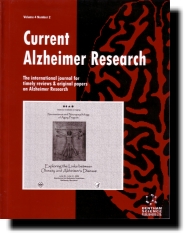 (From Current Alzheimer Research, April 2007.)
(From Current Alzheimer Research, April 2007.)
Suzana S. Petanceska, Neuroscience and Neuropsychology of Aging Program, National Institute on Aging
There is a worldwide increase in obesity and this increase is of epidemic proportions in the United States [1]. In the last few years, a number of epidemiological studies have pointed to a link between obesity at midlife and the risk of late-life dementia and Alzheimer’s disease (AD) [2]. Obesity is a key component of metabolic syndrome which is defined as a clustering of central adiposity, insulin resistance, atherogenic dyslipidemia, hypertension, and endothelial dysfunction. Epidemiological data have also found an association between metabolic syndrome and accelerated cognitive decline in non-demented elderly individuals. This negative impact is further accentuated in individuals with high levels of inflammatory markers in their circulation [3]. Individual components of metabolic syndrome, such as insulin resistance, midlife hypercholesterolemia and hypertension also correlate with increased risk of developing AD [4]. In light of these findings and given the rise in childhood obesity [5] and the prevalence of obesity and metabolic syndrome in the US, there is a need to stimulate research that would examine the possible link between obesity, as well as other components of metabolic syndrome, and AD and to delineate the molecular mechanisms by which disrupted systemic metabolism may influence the transition between normal brain aging and Alzheimer’s disease. As a first step towards this goal the National Institute on Aging (NIA) convened a two-day multidisciplinary workshop that brought together basic research scientists, epidemiologists and clinicians from academia as well as from the pharmaceutical industry. The scientific background of the speakers spanned neuroscience, physiology, endocrinology and genetics. In addition to the 21 speakers, the workshop convened about 40 guests from the NIA, the National institute of Neurological Disorders and Stroke, National Institute of Diabetes and Digestive and Kidney Diseases, the Office of Dietary Supplements, and other relevant organizations such as the Alzheimer’s Association, the Institute for the Study of Aging, the American Diabetes Association, and the Food and Drug Administration. The workshop was co-sponsored by the Office of Dietary Supplements at the National Institute of Health and by the Alzheimer’s Association.
The participants of this exploratory workshop critically appraised the current state of knowledge on the subject of obesity, metabolic syndrome and cognition as it relates to AD. This Special Issue brings an array of minireviews, position papers and original research articles contributed by the workshop participants and their colleagues. The authors present a number of new ideas as to how this complex subject can be addressed for the purpose of advancing our understanding and treatment of AD. Some of the questions raised at the workshop and in this issue are:
- Do obesity and other components of the metabolic syndrome influence normal brain aging and the transition between normal brain aging and AD, and if so, by what mechanisms?
- Do individual components of the metabolic syndrome interact to accelerate brain aging and if they do, what mechanisms are involved?
- What is the impact of obesity, hypertension, dyslipidemia and systemic proinflammatory state on the cerebrovasculature and the neurovascular unit?
- Are there late-life cognitive consequences of over-feeding or underfeeding early in life and during development?
- Does early programming play a role in the etiology of sporadic Alzheimer’s disease and, if it does, which epigenetic mechanisms are involved?
- Do the hypothalamic-pituitary axis and glucocorticoids have a role in translating the disruption in systemic metabolic homeostasis to AD-related neurodegeneration and, if so, by what mechanisms?
- If certain components of the metabolic syndrome are in the causal pathway to AD or contribute to its progression what are the new therapeutic targets and modalities that we can address?
Most of these questions have yet to be answered and highlight some of the avenues of future research which promise to advance our understanding of the etiology of AD and to expand the therapeutic possibilities for prevention and treatment of this devastating disease. What is apparent however is that to gain a better understanding of AD we need to begin thinking “outside of the brain” and that some of the events that trigger changes leading to the late-life expression of this disease may occur early in childhood and even in utero.
REFERENCES:
[1] Ogden CL, Carroll MD, Curtin LR, McDowell MA, Tabal CJ, Flegal KM. Prevalence of overweight and obesity in the United States, 1999-2004. JAMA 295:1549-1555 (2006).
[2] Gorospe EC, Dave JK. The risk of dementia with increased body-mass index: a systematic review. Age Ageing (2006) Epub ahead of print.
[3] Yaffe K, Kanaya A, Lindquist K, Simonsick EM, Harris T, Shorr RI, Tylavsky FA, Newman AB. The metabolic syndrome, inflammation, and risk of cognitive decline. JAMA 292:2237-2242 (2004).
[4] Rosano C, Newman. Cardiovascular disease and risk of Alzheimer’s Disease. Neurol. Res. 28:612-620 (2006).
[5] Li C, Ford ES, Mokdad AH, Cook S. Recent trends in waist circumference and waist-height ratio among US children and adolescents. Pediatrics 111:e1390-1398 (2006).
